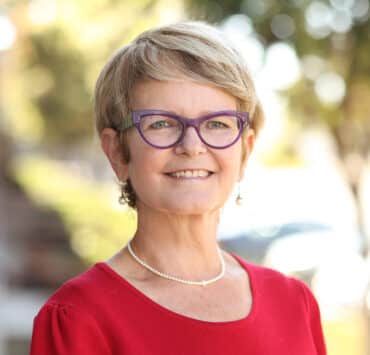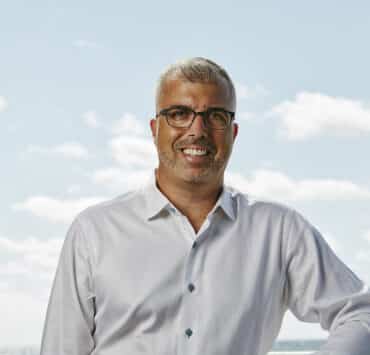As a clinician and researcher, Dr. Myra Altman always focused on the big picture. Her interests included anxiety, obsessive-compulsive disorder, and sleep, but her work consistently returned to a systems perspective: how can mental health professionals support the health of the whole person, and how can they understand the context in which that person lives?
“I got very interested in a systems view and how different factors influence mental health,” Dr. Altman says. “A lot of us think of mental health as ‘things an individual should do,’ but we know that person exists in the context of many areas. How does their work help them? How does their community help or harm them?” While many of her research colleagues focused on specific areas, Dr. Altman found her interests broadening and integrating these contextual questions.
At Modern Health, Dr. Altman serves as vice president of clinical research and strategy. Leading a team of sixteen, she is on a mission to ensure that the organization provides excellent mental healthcare for the employees it serves and assess and improve that care continuously. Modern Health is a mental health support platform providing a variety of care options and support tools to its members around the world.
“A lot of us think of mental health as ‘things an individual should do,’ but we know that person exists in the context of many areas.”
Dr. Myra Altman
“It’s important to me that we’re innovating in a way that’s safe and high-quality,” she explains. “The level of need in mental health around the globe will not be met by clinicians alone, nor by technology alone, but there’s something magical that happens when the best tech and clinical minds come together to ask how we can meet this need.”
Dr. Myra Altman notes that the demand for mental health services is high (and increasing), while availability remains limited—there aren’t enough trained clinicians. One way that Modern Health addresses the gap is by offering multiple types of support. Not every member is looking for or needs the level of care provided by a psychiatrist or a therapist; many can benefit from working with coaches, self-guided courses, groups, or meditations. Addressing those needs can have a strong positive impact on one’s mental health.
Another useful support tool has been Modern Health’s Daily Pause, a piece of featured mental health content at the front of the app and web portal. “You might only spend a couple minutes reading through it to learn something or think about something differently, but we also use it as a way to connect to other types of care,” Altman explains. “You might go on to match with a coach or a program. Plus, we find that 84 percent of people who do the Daily Pause say it improves their well-being; it’s very lightweight, but it can actually have an impact.”
Alongside Modern Health’s clinical strategy and research team, Modern Health’s clinical and scientific advisors, a group of accomplished clinicians and academics, provide insights and feedback across the platform. In putting together that team, Modern Health looked for diverse, highly qualified mental health experts who could examine specific areas of the platform and challenge the team to advance their product thoughtfully.
“Every time we put out a piece of research, the standard of care gets raised, and that’s one thing I focus on a lot: how do we continue to raise the bar on quality?”
Dr. Myra Altman
“One thing that’s really important to me is that these are not just advisors in name only,” Dr. Myra Altman notes. “We made sure that each advisor has a partner on the clinical strategy and research team, and they work very collaboratively to incorporate their feedback into the relevant efforts.”
Another group, the Global Inclusion Council (GIC), offers a platform for Modern Health providers around the world to share feedback on issues of equity and cultural specificity. As the company’s global membership expands, it’s crucial to maintain and advance equitable and culturally centered care, Altman says. Through the GIC platform, providers can share insights with the Modern Health team to illuminate blind spots and implement changes. Because the language and tools of mental healthcare vary from place to place and culture to culture, contextual sensitivity is important to Modern Health’s goal of reducing stigma and creating access across the globe.
“They’re licensed therapists and certified coaches from around the world who meet monthly to provide feedback on our platform and member experience to make sure it’s culturally relevant,” Altman explains. “For example, therapy doesn’t mean the same thing to people around the globe, so specificity is hugely important to getting people to access the platform.”
In all of her work, Altman emphasizes, clinical quality is paramount. She points to a selection of peer-reviewed studies demonstrating the quality of Modern Health’s global provider network and services. The most recent indicates that Modern Health members who used any one-on-one service were more two times more likely to improve in clinical depressive symptoms than those who did not.
The need for excellent mental healthcare will continue to grow, and Dr. Myra Altman sees Modern Health and its technologies as important tools to address it. “The technology is here to stay, so anything I can do to help bring talented clinicians and scientists into this space will really benefit everyone,” she says. “Every time we put out a piece of research, the standard of care gets raised, and that’s one thing I focus on a lot: how do we continue to raise the bar on quality?”


